2016考研英语翻译技巧之:省略法
第六章 常用翻译技巧-减词法(省略法)

7.We knew spring was coming as (because) we had seen a robin. 我们看见了一只知更鸟,知道春天快要到了。 (省略表示原因的连词) 8. If winter comes, can spring be far behind? 冬天来了,春天还会远吗? (省略表示条件的连词)
二、从修辞角度来看
(1)对重复出现的有些英语句子,英译汉时可作适 当省略。 Applicants who had worked at a job would receive Preference over those who had not. 所有申请者中,有工作经验的优先录取。 (试比较:“所有申请者中,有工作经验的,比没有 工作经验的,优先录取。”)
他消瘦而憔悴,看上去一副可怜相。
2. We live and learn. 活到老,学到老。
(译文中省略了作 主语的人称代词)
English-Chinese Written Translation. Copyright (C) 2006 by Wei Jianhua. All Rights Reserved
English-Chinese Written Translation. Copyright (C) 2006 by Wei Jianhua. All Rights Reserved
(四) 省略前置词(介词)
13. The People’s Republic of China was founded in 1949. 一九四九年中华人民共和国成立。 (省略表时间的in) (试比较:中华人民共和国成立于一九四九年。) 14. Smoking is prohibited in public places. 公共场所禁止吸烟。 (省略表地点的in) (试比较:不准在公共场所吸烟。) “鱼跃于渊”
翻译 省略法

Egbert said he was getting a dollar a mile. 埃格伯特说,他(开车)每天一英里就只赚一块钱。
(五)省略介词
一般来说,表示时间和地点的英语介词,译成汉语如果出现在句首, 大都可以省略,出现在句尾大都不可省略。
1.省略表示时间的前置词
Eg. The People’s Republic of China was founded in 1949. 1949年中华人民共和国成立。 中华人民共和国成立于1949年。 2. 省略表示地点的前置词 Eg. Smoking is prohibited in public places. 公共场所严禁吸烟。 In winter, it is much colder in the North than it is in the South. 冬天,北方的天气比南方冷得多。
(六)省略动词
英语句子中一般必须有谓语动词,而汉语句子中的谓语并不一定 非有动词充当,形容词和名词等同样可以作谓语。英译汉时可根据汉语的 习惯适当省略原文中的某些动词。 主要有两类:省略一些连系动词 省略一些与具有动词含义的名词等搭配使用的动词 Eg. When the pressure gets low, the boiling-point becomes low. 气压低,沸点就低。
(四)省略冠词
1. 英语有冠词,但是汉语没有,因此,英译汉是往往可将冠词省略 Eg. A teacher should have patience in his work. 当老师应该有耐心。(省略不定冠词A) It is out of the question to fly to the moon in the past. 在过去,飞往月球是绝对办不到的事情。(省略定冠词The) 2. 但是在某些场合,冠词不能省略,要翻译为“一个,每一,这个,那个”等 Eg. He left without saying a word. 他一句话也不说就走了。 This is the book you wanted. 这就是你要的那本书。
英语翻译技巧第十节 省略法

第十节省略法省略是删去一些可有可无的,或违背译文语言习惯的词。
一.从语法角度来看(一)省代词1.省略作主语的人称代词(1)英语中通常每句都有主语,如主语不变,译成汉语时不必重复。
1)He was thin and haggard and he looked miserable. 2)But it’s the way I am, and try as I might, I haven’t been able to change it.3)They had murdered his father, they had taken the best of him, they had crushed his whole family.4)Laura wished now that she was not holding that piece of bread-and-butter, but there was nowhere to put it and she couldn’t possibly throw it away.1)他消瘦而憔悴,()看上去很惨。
2)但我就是这个脾气,()虽然几经努力,()却未能改变过来。
3)他们害死了他的父亲,()榨干了他的精力,()毁了他的全家。
4)这时劳拉宁愿()手里没有这块涂上黄油的面包,拿着又没有地方放,()又不可能扔掉。
作业:1.I am 78 years old; I have been confined to my room with a paralytic stroke for the past 14 months.2. Like his friend he had many wonderful ideas, but he only put a few into practice.3. We can measure the amount of water in a pot, but we can’t measure its heat. We haven’t an instrument for that.4. The Grand Dukes always liked new ideas, and later they were good friends of Galileo.(2)泛指的英语人称代词作主语时,即使是第一个主语,汉译时也可省略。
英译汉翻译技巧省略法

英译汉翻译技巧省略法省略法(omission)是为了行文的简洁和更符合目的与习惯,将一些重复的词语或一些已被涵盖的意义省去的翻译方法,而原文的意义并未因此受到任何损失。
1.When she could no longer decide, she became depressed. Whenever Dwight picked up the baby to take him to his place or to the doctor’s for a checkup, she felt relief.她无法抉择,心情压抑,而前夫马赛一把孩子接走或是送到诊所接受检查她就会有一种轻松感。
2.Rupert with his flexible young knees sat in a hunch-and-crouch pose in imitation of the natives.鲁珀特年龄小,双膝柔韧,学着当地人的样子,弓背缩身地跪坐着。
3.Stainless steel possess good hardness and high strength.不锈钢硬度大,强度高。
4.Penicillin works by not allowing a bacterium to build its cell wall.青霉素的作用是不让细菌制造细胞壁。
5. This is the solid rocky bottom under the ooze and mud of the ocean floor.海底软泥和泥层下面是坚硬的岩石层。
6. There is a 30% increase of our installed capacity with this year.今年,我们的装机容量增加了 30%。
7.在工作中,我们必须避免犯不必要的的错误。
We must avoid making mistakes in our work.8.质子带阳电,电子带阴电,而中子既不带阳电也不带阴电。
第九讲 英语翻译技巧省略法
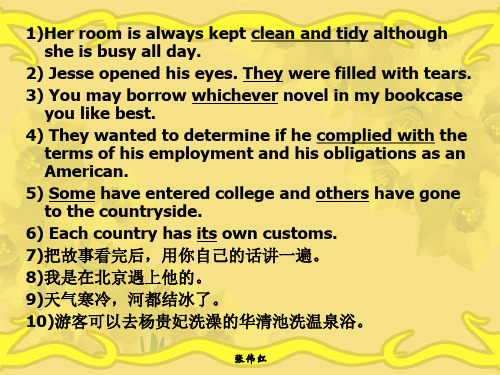
1) Her room is always kept clean and tidy though she is busy all day. 尽管她整天忙忙碌碌, 她的房间却保持得干干净净,利利落落。 2) Jesse opened his eyes. They were filled with tears. 杰西睁开眼睛, 眼里充满了泪水。 3) You may borrow whichever novel in my bookcase you like best. 我书架上的小说你最爱哪一本, 你就可以借哪一本。 4)They wanted to determine if he complied with the terms of his employment and his obligations as an American. 他们想要确定, 他是否履行了受雇条件, 是否履行了作为美国 公民所应尽的职责。 5)Some have entered college and others have gone to the countryside. 上大学的上大学, 下乡的下乡。 张伟红
张伟红
第九讲 省略法 (Omission)
2009-11-2
张伟红
一、练习 二、英汉翻译中的省略技巧 三、汉英翻译中的省略技巧
1.省略某些重复词语 2.省略表示范畴的词语 3.省略可能影响译文修辞效果的词语
四、汉译英练习
张伟红
一、英汉翻译中的省略技巧
Eg.1)You can never tell who is right. 很难说谁对谁错。(省略人称代词) 2)Those who are in favor please hold up their hands. 赞成的请举手。(省略指示代词、关系代词和物主代词) 3)It’s necessary to develop our computer science at high speed. 必须高速发展我国的计算机科学。(省略形式主语it) 4)A deaf husband and a blind wife are always a happy couple. 丈夫聋,妻子瞎,美美满满过一家。(省略冠词)
翻译中省略法的处理

考虑语境:在应用省略法时,需要考虑语境,确保省略后的文本在语境中 仍然能够理解。
保持原文风格原则
尊重原文的语言 风格和表达方式
保持原文的修辞 手法和情感色彩
避免过度翻译, 尽量保持原文的 简洁性和流畅性
0 1
作用:省略法 可以避免翻译 后的文本过于 冗长,提高阅 读体验。
0 2
应用范围:省 略法适用于各 种类型的文本, 包括文学、科 技、商业等领 域。
0 3
注意事项:在 使用省略法时, 需要注意保持 原文的意思和 逻辑,避免产 生误解。
0 4
省略法的分类
完全省略:省略整个句子或段落 部分省略:省略句子中的某些成分,如主语、谓语、宾语等 隐含省略:通过上下文暗示省略的内容 结构省略:省略句子中的某些结构,如连词、介词等
0
0
0
0
1
2
3
4
保留关键词,省略重复信息
识别关键词:找出句 子中的主要信息,保
留关键部分
省略重复信息:删除 重复出现的词汇或短
语,保持句子简洁
调整语序:根据目标 语言的语法规则,调
整句子结构
确保准确性:在省略 过程中,确保翻译的
准确性和完整性
05
翻译中省略法的注意事 项
注意文化差异
在翻译过程中,要注意不 同文化之间的差异,避免 因文化差异导致的误解和
翻译中省略法的处理
,a click to unlimited possibilities
汇报人:
目录 /目录
01
翻译中省略法 的概念
02
翻译中省略法 的应用
英语翻译之省略法

⑸省译动词
• ①谓语动词的省译。 • 谓语动词,是英语句中必不可少的成分。 汉语则不然,句中可以没有动词而直接用 形容词、名词或词组作谓语。所以,有些 英语谓语动词汉译时可以不译出,句子反 而更为通顺有力。(了解汉语这个特点, 汉译英时,可把某些汉语中的形容词、名 词或词组译成动词。)
ቤተ መጻሕፍቲ ባይዱ
• 例 : The charged capacitor behaves as a secondary battery. • 充了电的电容器,就像一个蓄电池一样。 • Friction always opposes the motion whatever its direction may be. • 不管运动方向怎样,摩擦力总是同运动方向相反。
• He declined to amplify on the President’s statement, since he had not read the text. • 他没有看到总统讲话的文本,不愿意加以发挥. • If I had known it,I would not have joined in it.早知 如此,我就不参加了。 • John rose gloomily as the train stopped, for he was thinking of his ailing mother. • 火车停了,John 郁郁地站了起来,因为他想起了病 中的母亲.
• 表示原因、条件、时间等的连词,常省译。 • 例:As the temperature increase, the volume of water becomes greater. • 温度增高,水的体积就增大。 • Wise men love truth, whereas fools shun it. • 智者爱好真理,愚者躲避真理。 • The average speed of all molecules remains the same, as long as the temperature is constant. • 温度不变,所有分子的平均速度也就不变。
2016考研英语翻译技巧之:省略法
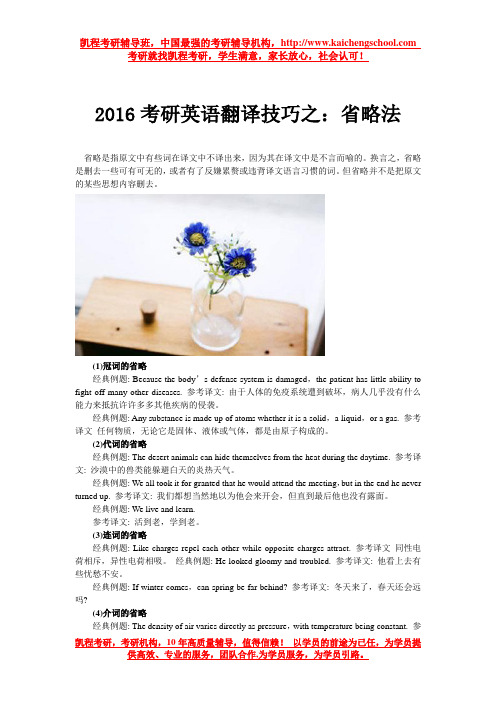
2016考研英语翻译技巧之:省略法省略是指原文中有些词在译文中不译出来,因为其在译文中是不言而喻的。
换言之,省略是删去一些可有可无的,或者有了反嫌累赘或违背译文语言习惯的词。
但省略并不是把原文的某些思想内容删去。
(1)冠词的省略经典例题: Because the body’s defense system is damaged,the patient has little ability to fight off many other diseases. 参考译文: 由于人体的免疫系统遭到破坏,病人几乎没有什么能力来抵抗许许多多其他疾病的侵袭。
经典例题: Any substance is made up of atoms whether it is a solid,a liquid,or a gas. 参考译文任何物质,无论它是固体、液体或气体,都是由原子构成的。
(2)代词的省略经典例题: The desert animals can hide themselves from the heat during the daytime. 参考译文: 沙漠中的兽类能躲避白天的炎热天气。
经典例题: We all took it for granted that he would attend the meeting,but in the end he never turned up. 参考译文: 我们都想当然地以为他会来开会,但直到最后他也没有露面。
经典例题: We live and learn.参考译文: 活到老,学到老。
(3)连词的省略经典例题: Like charges repel each other while opposite charges attract. 参考译文同性电荷相斥,异性电荷相吸。
经典例题: He looked gloomy and troubled. 参考译文: 他看上去有些忧愁不安。
英语翻译之省略法
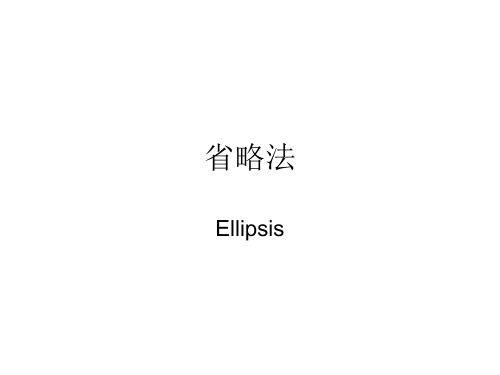
• He declined to amplify on the President’s statement, since he had not read the text.
• 他没有看到总统讲话的文本,不愿意加以发挥. • If I had known it,I would not have joined in it.早知
• 众所周知,重量是地球作用在物体上的引力。
• ③强调句中的it,本身无词义,省译。 • 例 : It is a man’s social being that
determines his thinking. • 是人们的社会存在,决定人们的思想。
• ⑺同义词或近义词的省译
• 英语中,特别是科技英语中,有些同义词 或近义词连在一起用,或者表示强调,使 意思更加明确,或者表示一个名称的不同 说法。英译汉时,往往只译其中的一个, 或把意思综合起来译即可。
• 例:When heated, gases act in exactly the same way as liquid acts.
• 气体受热时所发生的变化与液体完全一样。
• 在实践中,动词省译还见于下列两种情况: • •某些系动词,如be, become, get等,如以形容
词或介词短语作表语时,这类动词常可省译。
• 化学反应的速度和反应物的浓度成正比。
• The basic function of the triode is as an amplifier. • 三极管的基本功能是作电流放大器。 • ⑵省译介词
• 英语中,词与词的关系通常是用介词来表示的。而汉语 中,词与词的关系是通过语序和逻辑关系
• 来表示。所以,英译汉时,许多介词可省略不译。 比如,表示时间、地点的介词,译成汉语时出现 在句首的可省译。
英语笔译技巧 省略法

英语笔译技巧省略法英语笔译技巧:省略法省略法是指在翻译中,原文中有些词在译文中可以省略,不必翻译出来。
因为译文中虽然没有这个词,但是已经具有了原文这个词所表达的意思,或者这个词在译文中的意义是不言而喻的。
省略的目的在于使译文更加通顺流畅,更符合译文习惯。
但需要注意的是,省略并不是把原文的某些思想内容删去,省略不能改变原文的意义。
根据汉语习惯,前句出现一个主语,后句如仍为同一主语,就不必重复出现。
英语中通常每句都有主语,因此人称代词作主语往往屡次出现,这种人称代词汉译时常常可以省略。
英语中,泛指人称代词作主语时,即使是作第一个主语,在汉语译文中往往也可以省略。
I had many wonderful ideas, but I only put a few into practice.我有很多美妙的想法,但是只把少数付诸实践了。
He was thin and haggard and he looked miserable.他瘦弱憔悴,看上去一副可怜相。
We live and learn.活到老,学到老。
The significance of a man is not in what he attained but rather in what he longs to attain.人生的意义不在于已经获取的,而在于渴望得到什么样的东西。
英语中有些作宾语的代词,不管前面是否提到过,翻译时往往可以省略。
The more he tried to hide his mistakes, the more he revealed them.他越是想要掩盖他的错误,就越是容易暴露。
Please take off the old picture and throw it away.请把那张旧画取下来扔掉。
英语句子中的物主代词出现的频率相当高。
一个句子往往会出现好几个物主代词,如果将每个物主代词都翻译出来,那么汉语译文就显得非常罗嗦。
英译汉翻译技巧——省略法

英译汉翻译技巧——省略法省略法(ellipsis)是英汉翻译中常用的一种技巧,指的是在翻译过程中,将原文中的一些成分或内容省略掉,不翻译出来,以达到简洁明了的效果。
省略法在英汉翻译中非常常用,因为两种语言在表达方式和结构上存在很大的差异,在进行翻译时,适当地运用省略法能够更符合汉语的表达习惯。
一、省略法的分类根据省略的内容和形式,省略法可分为语义省略和结构省略。
1.语义省略语义省略是指在翻译过程中,省略掉原文中的一些内容,但仍然保留了原文的意义。
这类省略可以通过上下文的推理和理解来补足。
例如,原文中的“Do you want some tea?”可以省略为“Want some tea?”这样的表达。
在进行翻译时,我们可以根据前后文的信息,推测出原文主语是“you”,并在翻译中省略掉这个主语,直接翻译为“想要喝点茶吗?”。
2.结构省略结构省略是指在翻译过程中,省略掉原文中的一些句法结构或成分,以便更符合汉语的表达习惯。
例如,原文中的“I'm going to the store, do you want anything?”可以省略为“I'm going to the store, want anything?”这样的表达。
在进行翻译时,我们可以省略掉原文中的助动词“do”和主语“you”,以达到更简洁的表达效果。
二、运用省略法的原则1.保持语意的完整性在运用省略法时,应尽量保持原文语意的完整性,避免省略导致语意不清或解释不明的情况发生。
例如,原文中的“I'm going shopping. See you later!”可以省略为“I'm going shopping. See you!”这样的表达。
虽然省略了“later”,但是通过上下文的推测,读者仍然能够理解原文的意思。
2.保持句子结构的完整性在运用省略法时,应尽量保持句子结构的完整性,避免省略导致句子结构混乱或文法错误的情况发生。
英汉翻译法5——省略法

2.2.3 省略法省略法也被称为减词法(pruning)。
跟增词法刚好相反,省略法是指把原文中有的词语省掉不译出来,但省掉的都是一些可有可无的或违背译语语言习惯的词,如实词众的代词、动词的省略,虚词中的冠词、介词和连词的省略等,目的是为了在忠实的基础上使译文更加简洁通顺。
一、由于语法差异而需要省略:1.代词的省略:英语中代词的使用频率远远高于汉语,根据实际情况有时需要把代词所指代的人或事物重复出来,而有时则可以直接省掉,有人称代词(主格或宾格),物主代词等。
例1.Order is order. We cannot complain, we cannot bargain, we cannot question and we cannot suggest changes.命令就是命令,不得抱怨,不得讨价还价,不得置疑,不得建议修改。
例2.One must make painstaking efforts before one can master a foreign language.要掌握一门外语非下苦功夫不可.例3.He put his hands in his pockets and then shrugged his shoulders.他把双手放进衣兜里,耸了耸肩。
例4. A person with nerve damage in the spinal cord can grasp objects when his or her forearms are activated by a device like this one.脊髓神经有损伤的人使用这样的装置后,前臂肌肉被激活,便能抓住东西。
2.It的省略:it作形式主语或宾语,强调句中的it,或表示自然现象、时间、地点、距离等的it常常可以省略。
例:P313.连接词的省略:英语是一种形合的语言,连接词使用较多;而汉语是一种意合的语言,上下文的关系往往是暗含的,所以原文的一些连接词常常可以省略。
翻译之省略法
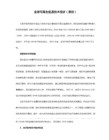
I had many wonderful ideas, but I only put a few into practice.
我有很多美妙的想法,但是只把少数付诸实践了。
He was thin and haggard and he looked miserable.
他瘦弱憔悴,看上去一副可怜相。
翻译之省略法.txt我这辈子只有两件事不会:这也不会,那也不会。人家有的是背景,而我有的是背影。 肉的理想,白菜的命。肉的理想,白菜的命。白马啊 你死去哪了!是不是你把王子弄丢了不敢来见我了。 一、从语法角度来看
(一)省代词
1.省略作主语的人称代词
(1)省略作主语的人称代词
冬天来了,春天还会远吗?(省略表示条件的连接词)
If I had known it, I would not have joined in to.
早知如此,我就不参加了。(省略表示条件的连接词)
John rose gloomily as the train stopped, for he was thinking of his ailing mother.
火车停了,约翰郁郁地站了起来,因为他想起了病中的母亲。(省略表示时间的连接词)
(四)省略冠词
1.英语有冠词,汉语没有冠词;因此,英译汉时往往可将冠词省略。
A teacher should have patience in his work.
当教员的应当有耐心。(省略不定冠词A)
The horse is a useful animal.
马是有益的动物。(省略定完词The)
It is out of the question to fly to the moon in the past.
英语翻译技巧第十节 省略法

第十节省略法省略是删去一些可有可无的,或违背译文语言习惯的词。
一.从语法角度来看(一)省代词1.省略作主语的人称代词(1)英语中通常每句都有主语,如主语不变,译成汉语时不必重复。
1)He was thin and haggard and he looked miserable. 2)But it’s the way I am, and try as I might, I haven’t been able to change it.3)They had murdered his father, they had taken the best of him, they had crushed his whole family.4)Laura wished now that she was not holding that piece of bread-and-butter, but there was nowhere to put it and she couldn’t possibly throw it away.1)他消瘦而憔悴,()看上去很惨。
2)但我就是这个脾气,()虽然几经努力,()却未能改变过来。
3)他们害死了他的父亲,()榨干了他的精力,()毁了他的全家。
4)这时劳拉宁愿()手里没有这块涂上黄油的面包,拿着又没有地方放,()又不可能扔掉。
作业:1.I am 78 years old; I have been confined to my room with a paralytic stroke for the past 14 months.2. Like his friend he had many wonderful ideas, but he only put a few into practice.3. We can measure the amount of water in a pot, but we can’t measure its heat. We haven’t an instrument for that.4. The Grand Dukes always liked new ideas, and later they were good friends of Galileo.(2)泛指的英语人称代词作主语时,即使是第一个主语,汉译时也可省略。
考研英语英译汉十大难点之省略关系
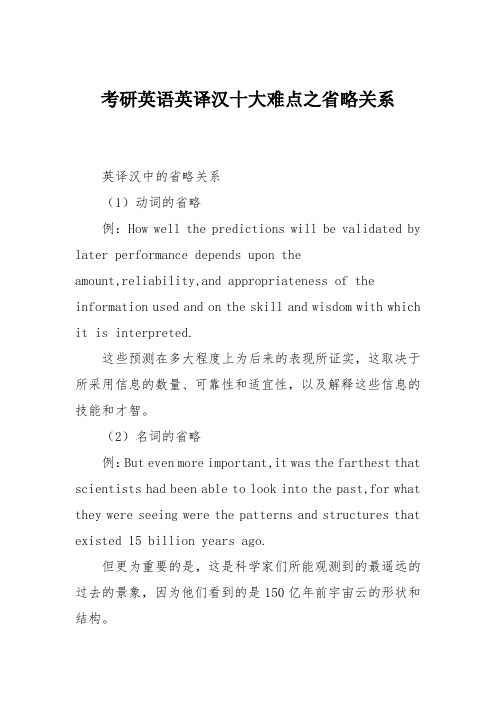
考研英语英译汉十大难点之省略关系英译汉中的省略关系(1)动词的省略例:How well the predictions will be validated by later performance depends upon theamount,reliability,and appropriateness of the information used and on the skill and wisdom with which it is interpreted.这些预测在多大程度上为后来的表现所证实,这取决于所采用信息的数量、可靠性和适宜性,以及解释这些信息的技能和才智。
(2)名词的省略例:But even more important,it was the farthest that scientists had been able to look into the past,for what they were seeing were the patterns and structures that existed 15 billion years ago.但更为重要的是,这是科学家们所能观测到的最遥远的过去的景象,因为他们看到的是150亿年前宇宙云的形状和结构。
(3)修饰语的省略例:But even more important,it was the farthest that scientists had been able to look into the past,for what they were seeing were the patterns and structures that existed 15 billion years ago.但更为重要的是,这是科学家们所能观测到的最遥远的过去的景象,因为他们看到的是150亿年前宇宙云的形状和结构。
(4)从句引导词的省略(5)相同结构的省略例:Actually,it isn’’t,because it assumes that there is an agreed account of human rights,which is something the world does not have.事实上这种提问并不能把问题讲清楚,因为它是以人们对人权的共同认识为假设的,而这种共同认识并不存在。
英译汉翻译技巧-省略法

详细描述
省略冗余细节
在翻译过程中,对于不影响整体意义表达的不必要修饰,可以进行适当的省略。
总结词
在英语中,作者有时会使用一些修辞手法或表达方式来增强语言的艺术性和感染力。但在汉语中,这些修辞手法可能并不常见或被认为是不必要的修饰。因此,在翻译时可以选择省略这些不必要修饰,以保持译文的自然流畅。例如,英文原文中的比喻、拟人等修辞手法在中文中可能并不需要保留,可以直接省略或替换为更符合中文表达习惯的表述方式。
译者应注重提高自己的阅读和理解能力,准确把握原文的意义和风格,避免因理解错误而导致省略不当。
对译者的建议
THANKS FOR
WATCHING
感谢您的观看
Байду номын сангаас
句子层面实例分析
在句子层面,省略法还可以用于去除冗余表达,使译文更加精炼。
总结词
英语句子中有时会出现冗余的表达,如多余的修饰语、重复的修饰成分等。在翻译成汉语时,为了使句子更加精炼有力,可以选择省略这些冗余表达,只保留核心信息。例如,英语中的"very"可以省略不译,以使译文更加简洁明了。
详细描述
宾语是句子中重要的信息载体之一,但在某些情况下,省略宾语可以使句子更加简洁明了。
总结词
在翻译过程中,如果英语原句的宾语在上下文中已经明确,或者宾语对于句子的意义不是关键要素,可以考虑省略宾语,使译文更加流畅自然。
详细描述
省略宾语
总结词
除了主语、谓语和宾语之外,英语句子中还可能包含其他成分,如定语、状语、补语等。在翻译过程中,这些成分也可以根据需要进行省略。
冗余信息的省略
英文中有时会有一些冗余的词语或句子,这些在中文中并不需要翻译出来,可以直接省略。
考研英语省略句翻译小技巧
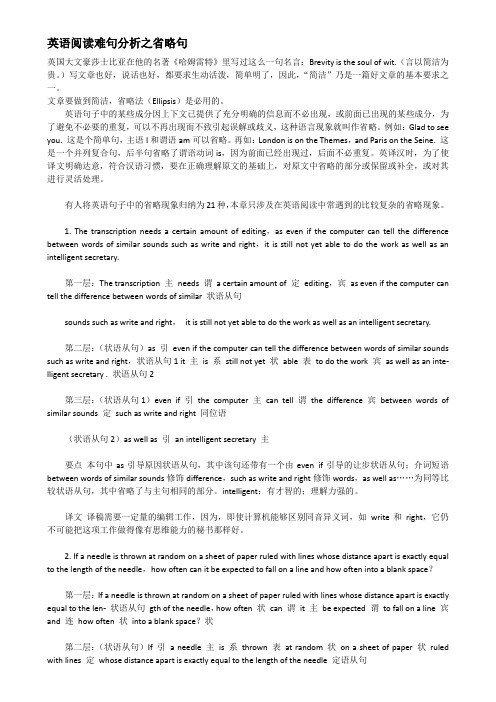
英语阅读难句分析之省略句英国大文豪莎士比亚在他的名著《哈姆雷特》里写过这么一句名言:Brevity is the soul of wit.(言以简洁为贵。
)写文章也好,说话也好,都要求生动活泼,简单明了,因此,“简洁”乃是一篇好文章的基本要求之一。
文章要做到简洁,省略法(Ellipsis)是必用的。
英语句子中的某些成分因上下文已提供了充分明确的信息而不必出现,或前面已出现的某些成分,为了避免不必要的重复,可以不再出现而不致引起误解或歧义,这种语言现象就叫作省略。
例如:Glad to see you. 这是个简单句,主语I和谓语am可以省略。
再如:London is on the Themes,and Paris on the Seine. 这是一个并列复合句,后半句省略了谓语动词is,因为前面已经出现过,后面不必重复。
英译汉时,为了使译文明确达意,符合汉语习惯,要在正确理解原文的基础上,对原文中省略的部分或保留或补全,或对其进行灵活处理。
有人将英语句子中的省略现象归纳为21种,本章只涉及在英语阅读中常遇到的比较复杂的省略现象。
1. The transcription needs a certain amount of editing,as even if the computer can tell the difference between words of similar sounds such as write and right,it is still not yet able to do the work as well as an intelligent secretary.第一层:The transcription 主needs 谓a certain amount of 定editing,宾as even if the computer can tell the difference between words of similar 状语从句sounds such as write and right,it is still not yet able to do the work as well as an intelligent secretary.第二层:(状语从句)as 引even if the computer can tell the difference between words of similar sounds such as write and right,状语从句1 it 主is 系still not yet 状able 表to do the work 宾as well as an inte- lligent secretary . 状语从句2第三层:(状语从句1)even if 引the computer 主can tell 谓the difference 宾between words of similar sounds 定such as write and right 同位语(状语从句2)as well as 引an intelligent secretary 主要点本句中as引导原因状语从句,其中该句还带有一个由even if引导的让步状语从句;介词短语between words of similar sounds修饰difference,such as write and right修饰words,as well as……为同等比较状语从句,其中省略了与主句相同的部分。
英汉翻译之省略法

广告中有时会出现一些夸张的表达或修辞手法,为了使译文更加自然流畅,可以适当省略或简化。例 如,“The car provides the ultimate driving experience”可以简化为“极致驾驶体验”,以更符 合中文的表达习惯。
文学作品类文本的省略法应用
文学作品的语言通常比较丰富和细腻,因此 在英汉翻译文学作品时,可以根据目标读者 的阅读习惯和审美需求,适当省略一些细节 或冗余的描写。例如,“She walked slowly through the streets, her heart heavy with sorrow”可以简化为“她缓缓 地穿过街道,心怀悲伤”,以更符合中文的 表达方式。
英汉翻译之省略法
contents
目录
• 省略法概述 • 省略法在英汉翻译中的应用 • 省略法在英汉翻译中的注意事项 • 省略法在英汉翻译中的实践案例 • 总结与展望
01
CATALOGUE
省略法概述
定义
省略法是指在英汉翻译过程中,为了 使译文更加流畅、自然,对原文中的 某些词语、句子或表达进行省略的处 理方法。
广告类文本的省略法应用
广告语言通常追求创意和吸引力,因此在英汉翻译广告时,可以根据目标受众的文化背景和语言习惯 ,适当省略一些不必要的信息或冗余的表达。例如,“The product is made from the finest ingredients”可以简化为“精选原料,品质保证”,以更符合中文广告的语言风格。
- 1、下载文档前请自行甄别文档内容的完整性,平台不提供额外的编辑、内容补充、找答案等附加服务。
- 2、"仅部分预览"的文档,不可在线预览部分如存在完整性等问题,可反馈申请退款(可完整预览的文档不适用该条件!)。
- 3、如文档侵犯您的权益,请联系客服反馈,我们会尽快为您处理(人工客服工作时间:9:00-18:30)。
省略是指原文中有些词在译文中不译出来,因为其在译文中是不言而喻的。
换言之,省略是删去一些可有可无的,或者有了反嫌累赘或违背译文语言习惯的词。
但省略并不是把原文的某些思想内容删去。
(1)冠词的省略
经典例题: Because the body’s defense system is damaged,the patient has little ability to fight off many other diseases. 参考译文: 由于人体的免疫系统遭到破坏,病人几乎没有什么能力来抵抗许许多多其他疾病的侵袭。
经典例题: Any substance is made up of atoms whether it is a solid,a liquid,or a gas. 参考译文 任何物质,无论它是固体、液体或气体,都是由原子构成的。
(2)代词的省略
经典例题: The desert animals can hide themselves from the heat during the daytime. 参考译文: 沙漠中的兽类能躲避白天的炎热天气。
经典例题: We all took it for granted that he would attend the meeting,but in the end he never turned up. 参考译文: 我们都想当然地以为他会来开会,但直到最后他也没有露面。
经典例题: We live and learn.
参考译文: 活到老,学到老。
(3)连词的省略
经典例题: Like charges repel each other while opposite charges attract. 参考译文 同性电荷相斥,异性电荷相吸。
经典例题: He looked gloomy and troubled. 参考译文: 他看上去有些忧愁不安。
经典例题: If winter comes,can spring be far behind? 参考译文: 冬天来了,春天还会远吗?
(4)介词的省略
经典例题: The density of air varies directly as pressure,with temperature being constant. 参考译文温度不变,空气的密度和压力成正比。
经典例题: Smoking is prohibited in public places. 参考译文: 公共场所不许吸烟。
经典例题: A body in motion remains in motion unless acted on by an external force. 参考译文 如果没有外力的作用,运动的物体仍然保持运动状态。
(5)同位语前置名词的省略
经典例题: Behaviorists,in contrast,say that differences in scores are due to the fact that blacks are often deprived of many of the educational and other environmental advantages that whites enjoy.
分析:在同位句中,the fact就是指that所引导的blacks are often deprived of?that whites enjoy.在翻译成汉语时,就可以省略the fact,以免显得累赘。
参考译文: 相反,行为主义者认为,成绩的差异是由于黑人往往被剥夺了白人在教育及其他环境方面所享有的许多有利条件。
(1990年真题)
(6)同义词或近义词的省略
经典例题: Technology is the application of scientific method and knowledge to industry to satisfy our material needs and wants.
分析: 例句原文中的needs and wants是近义词,在英语中常一起出现,但从中文的角度来看,表达的是同一个意思。
所以译文可以简洁一些。
参考译文: 技术就是在工业上应用科学方法和科学知识以满足我们物质上的需求。
经典例题: Insulators in reality conduct electricity but,nevertheless,their resistance is very high.分析: but,nevertheless是近义词,在文中都表示“但是”。
